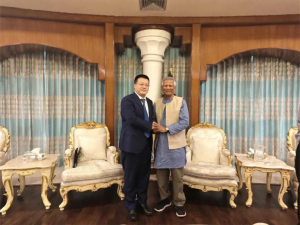Yunus invited Chinese companies to relocate their photovoltaic panel manufacturing enterprises to Bangladesh, which may provide new opportunities for Chinese photovoltaic industry.

On August 25, Yao Wen, Chinese ambassador to Bangladesh, held talks with Yunus, chief adviser to the interim government of Bangladesh. Yunus proposed strengthening economic cooperation between the two countries during the meeting, especially inviting Chinese companies to relocate photovoltaic panel manufacturing plants to Bangladesh to promote the country’s green economic transformation and export growth.
In his statement, Yunus stressed that China, as the world’s leading producer of photovoltaic panels, faces restrictions on export markets. He suggested that Chinese manufacturers consider moving some production facilities to Bangladesh, which will not only help Chinese companies expand their markets, but also promote the diversification and green development of Bangladesh’s economy. Yunus’ proposal was also supported by the Bangladeshi military.
Why Bangladesh chose to cooperate with China at this time can be traced back to last month.
Political turmoil in Bangladesh
Last month, Bangladesh experienced dramatic political changes. Nationwide protests resulted in serious casualties, followed by the resignation of Prime Minister Hasina on August 5. Immediately afterwards, Army Chief of Staff Zaman announced the establishment of an interim government to govern the country, and the president announced the dissolution of the National Assembly on August 6. On August 7, Nobel Peace Prize winner Muhammad Yunus was appointed as the chief adviser of the interim government of Bangladesh and was sworn in on August 8, marking the official establishment of the interim government. Yunus emphasized at a press conference before taking office that stabilizing public security is the top priority of the interim government.
The country is already in chaos, and foreign threats need to be resolved urgently.
The United States and India are playing games for Bangladesh
Due to its important geographical location, Bangladesh has become a must-win place for both the United States and India. The former leader of Bangladesh, Prime Minister Hasina, has been dealing with the big powers, trying to maintain a balance, but her pro-Indian tendency is also very obvious.
Bangladesh’s recent political turmoil is closely related to Hasina’s pro-Indian foreign policy. Moreover, after she went into exile in India, anti-Indian sentiment intensified and Hindu communities were attacked, which has affected bilateral relations and trade. Hasina gave her first speech in India after the coup, suggesting that the coup might have been avoided if the sovereignty of St. Martin had been handed over to the United States earlier. This statement also directly pointed the finger at the United States.
Previously, the United States had threatened Hasina to build a military base in Bangladesh. St. Martin is its strategic goal and is related to the control of the Bay of Bengal. If the United States controls the Bay of Bengal, it may not only deter India, but also form an encirclement in the northwest of China, while interrupting China’s “Belt and Road” initiative aimed at extending its economic influence to the Indian Ocean region.
Therefore, after Hasina steps down, if the opposition takes power and stabilizes the situation, the United States will expand its influence in South Asia, but will also face competition from India and pro-Hasina forces. India’s willingness to accept Hasina may also be to safeguard its own interests and regional balance.
The attitude of the new government is unclear, and the expectations of the United States and India are dashed?
Under the influence of British colonialism, Bangladesh was separated from the military and the military had a greater say. The coup was also led by the military, and Hasina was “forced to resign.” As the chief adviser to the new interim government of Bangladesh, Yunus has won the Nobel Peace Prize, and his rise to power must have been supported by the military.
Although the United States may have intervened in this coup, the root cause is that the military is dissatisfied with Hasina’s pro-India policy and is worried about damaging its own interests. In addition, Hasina’s remarks implying that the United States is the culprit have further attracted the attention of the military. The previously balanced relationship between China, the United States and India has undergone subtle changes at this time, and a cautious attitude towards the United States and India is inevitable.
Bangladesh tends to lean towards China, so the Yunus government is very likely to implement a pro-China policy. At this time, Yunus’s choice to propose cooperation with China’s photovoltaic industry is also an excellent opportunity to express his position, and it is also a new opportunity for China’s photovoltaic industry to seek overseas development.
Conclusion:
By establishing a production base in Bangladesh, Chinese photovoltaic companies can not only circumvent some international trade restrictions, but also enter a new market, reduce competitive pressure, and provide transformation opportunities for China’s photovoltaic industry.


